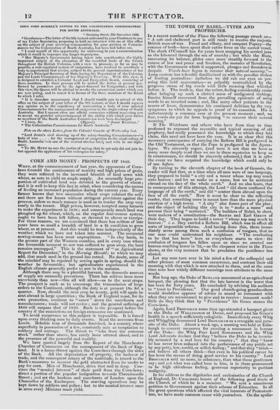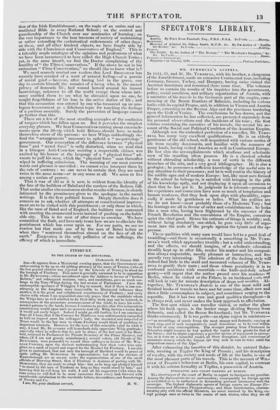THE TOWER OF BABEL—TYPES AND PROPHECIES.
Ix a recent number of the Times the following passage struck us- " A safe and sheltered port is still ready to receive the majestic British man-of-war. Fraud and villany, and rampant Popery—the essence of both—have spent their entire force on the sacred vessel. The shark O'Connell has for years been snapping his serried jaws as she laboured through the sea of anarchy ; but while the State, recovering its balance, glides once more steadily forward in the course of law and peace and freedom, the monster of Revolution, with the Government which it supported, plunges and flounders in despair. Words have begun to recover their natural meaning."--- Long custom has tolerably fluniliarized us with the peculiar dialect of leading journalists: natheless we did rub our eyes on per- using this bold asseveration— so palpably contradicted by the gorgeous storm of big words with little meaning that whistled belbre it. The truth is, that the writer, feeling considerably easier after bringing up such a clotted mass of undigested verbiage, fimeies himself recovered from the prevailing epidemic of using words in an inverted sense ; and, like many other patients in the access of' fever, demonstrates his continued delirium by the very symptoms to which he appeals in proof of its cessation. His is unfortunately a common case at the present moment ; and, we fear, words are yet fbr from beginning " to recover their natural meaning."
If' The Watchman and others who have from time to time professed to expound the recondite and typical meaning of old prophecy, had really possessed the knowledge to which they laid claim, this need not have been the case. It is as clear that this necessary consequence of carrying the Reform Bill is prefigured in the Old Testament, as that the Pope is prefigured in the Apoca- lypse. We sincerely regret, (and were it not that we have so many more deeply-read than we are in these mysteries to keep us in countenance, we should be sincerely ashamed,) that it is after the event we have acquired the knowledge which could only be of use before.
By turning to the eleventh chapter of the book of Genesis, the reader will find that, at a time when all men were of one language, they prepared to build" a city and a tower whose top may reach unto heaven : and let us make us a name, lest we be scattered abroad on the face of the whole earth." And we also learn, that in consequence of this attempt, the Lord " did there confound the language of all the earth," and did "scatter them abroad upon the face of all the earth." Now it must be clear to the reflecting reader, that something more is meant here than the mere physical erection of a high tower. " A city" also forms part of the plan ; and the object of building this city is to " make a name" and prevent their being " scattered." The builders of Babel, in short, were makers of a constitution—the SIEYES and Earl GREYS of their day. They began to build a tower "whose top may reach to heaven :" i. e. they carried a Reform Bill, which was to effect all sorts of impossible reforms. And having done this, there imme- diately arose among them such a confusion of tongues, that no one man could understand his neighbour. "The everlasting to be that has been" here as everywhere starts to view : time confusion of tongues has fallen upon us since we erected our heaven-reaching tower in '32,—as the eloquent writer in the Times shows, at the very moment that he proclaims the pestilence has abated.
Let any man turn over in his mind a few of the colloquial and other phrases of most common OCCRITC1lCC, and contrast their old meaning with that which is now attached to them, and at the same time note how widely different meanings men attribute to the same words.
Not long ago, the Duke of RUTLAND announced at an agricultural banquet, the pleasing fact that the late harvest is the worst that has been for forty years. He concluded by advising his auditors to "trust to Providence." Our good church-going grandmothers would doubtless approve of advice in sound so consonant with what they are accustomed to give and to receive : innocent souls! little do they think that by "Providence" his Grace means the Corn-laws.
Again, Lord Baotionam some time ago attended a banquet given to the Duke of WELLINGTON at Dover, and proposed his Grace's health in a speech sufficiently eulogistic. Immediately every Whig and Whiggling denounced Lord BROUGHAM as a renegade and para- site of the Duke. About a week ago, a meeting was held at Edin- burgh to concert measures for erecting a monument in honour of time Duke : the Whig Peer Lord ROSERER RY and the Whig Lord Advocate declare that they "believe the Duke to be invaria- bly actuated by a real love for his country ;" that they " knew he has never been seduced into the performance of' any public act by any petty, low, sordid, or selfish feeling; " and that they "think— and believe all others think—that even in his political career he has been the means of doing good service to his country." Lord BaotainAst said HO more, in substance, than what these gentlemen say ; and yet what was called base in him, is in them pronounced to be high chivalrous feeling, generous superiority to partisan malignity.
In his address to the dignitaries and ecclesiastics of the Church of England, Dr. CHALMERS boasts of the following good deeds of the Church of which he is a member. " We sent a unanimous petition to Government against their scheme of Education. In all the great questions which affected the vital interests of Protestant- ism, we have made common cause with yourselves. On the spolia- tion of the Irish Establishment ; on the topic of an entire and un- mutilated Bible in every National School ; on the control and guardianship of the Church over our seminaries of learning ; on the vast importance to the best interests of society of maintaining or rather extending the ecclesiastical endowments of other days ; on these, and all other kindred objects, we have fought side by side with the Churchmen and Conservatives of England." This is a tolerably ample catalogue of the opinions and prolbssions of what we have been accustomed to hear called the High Church Tories ; yet, in the same breath, we find the Doctor complaining of the hostility of" the Ultra-Conservatives." If the above be not in his estimation " Ultra-Conservatism," we should like to know what is ?
We need scarcely remind our readers that Lord BliounnAm has recently been accused of a want of natural feeling—of a parade of unreel grief— because, after having laid in the grave, one day to contain himself, the remains of a being who, in the sacred privacy of domestic lif, had wound herself around • his inmost heartstrings, unknown to all the world except those whose inti- macy enabled them to see what he obtruded upon DO one, he sought forgetfulness of his loss in the active duties of life ; and that this accusation was uttered by one who treasured up an ana- logous bereavement as a felicitous topic for touching the feelings of a partisan assembly. Surely the perversion of language cannot go further than this. These are a few of the most startling examples of the confusion of tongues which has fallen upon us. But it pervades the simplest everyday phrases. We hear Conservatives ranting about encroach- ments upon the liberty which bold Britons should have to make themselves slaves of the parsons : we hear Whigs unblushingly de- fend the " arrangements " necessary to uphold a " no-patronage" government. Our conception of the difference between " physical force " and " moral force" is sadly disturbed, when we read that in a Glasgow Anti-Corn-law meeting a respectable citizen was excited by his horror at the language of a " physical force" ad- vocate to pull his nose, which the "physical force " man thereafter wiped in suffering submission. The meaning of our most current words and phrases is unsettled : we cannot even interpret them by the rule of contrary : we can never be certain that they are used twice in the same sense—or in any sense at all. We scent to live among a nation of parrots.
That it was of old as it is now, is evident from the identity of the fate of the builders of Babel and the carriers of the Reform Bill. That under similar circumstances similar results will ensue, is clearly intimated by the prominence given to the apologue in the sacred writings. It is the first political lesson. Deeply therefore does it concern us to ask, whether all attempts at constitutional improve- ment are to be visited with this punishment ; or only those in which, like the men of Babel and of England, the builders rest contented with erecting the ornamental tower instead of pushing on the habit- able city. This is for men of after times to consider. We have committed the fault, and have only to see how we are to alleviate the punishment which has come upon us. For our parts, we see no evasion but that made use of by the men of Babel before us when they " scattered themselves abroad on the face of all the earth." Emigration is the only palliative of our sufferings, the efficacy of which is immediate.

































 Previous page
Previous page